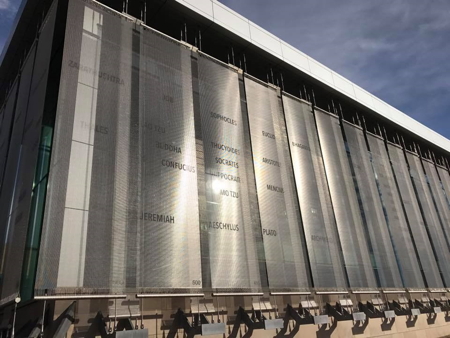
Nico Maloberti and I were part of a small group of Fellows within Liberty Fund who understood and agreed with the original strategic vision of its Founder Pierre F. Goodrich (PFG), which was to promote the ideal of a fully free society which would be comprised of “free and responsible individuals” interacting with each other in a purely voluntary manner by means of free markets, the rule of law, limited government, and free institutions of all kinds.
Note: see my “reconstruction” of Goodrich’s goals and strategies to achieve those goals, “Pierre F. Goodrich’s Goals and Strategy for the Liberty Fund: A Reconstruction”, which I wrote and circulated in 2018-19 and which Nico read , commented upon, and agreed with. And also my statement of how the OLL was designed to adhere to these principles and further PFG’s goals.
The counterpart to this study of liberty was the study of its direct opposite, namely the use of arbitrary power and coercion by the state and other organised groups, and the corrupting influence the use of power had on both the societies and the individuals on which it was exercised, as well the individuals who wielded that power. To paraphrase Lord Acton, whom PFG liked to quote, “liberty ennobles, while power corrupts”.
The method for achieving this goal, according to PFG, was not to engage in current policy debates or criticism, or party political activity, or journalism, but much more general, longer term educational and academic activity which would focus on the long history of thinking about liberty and power which stretched back over two and a half thousand years. This approach could be summarized as the study and appreciation of the ideas which lay behind current politics and political practices by a close reading of “the great books of liberty” which PFG had spent so much time and energy in identifying during the 1950s.
We had come to realize that LF had been drifting away from this original vision for some years under the leadership of a Board and Senior Management most of whom were not educators or academics, or even intellectuals (broadly understood) who were well-read in the classic texts of liberty as identified by the Founder. As Board members who had personally known the Founder or were educators and academics by training, retired or died, they were not replaced by similar like-minded individuals but by businessmen and lawyers who were more dilettantes in the world of ideas in which PFG liked to move. This “strategic drift” had become quite clear in 2010 when LF celebrated the 50th anniversary of its founding, and again more sharply in 2018 when a new Chairman and President organised an awkwardly termed and poorly carried out “strategic refresh,” along with an overhaul of operational procedures within LF which was promised but which never eventuated.
During the so-called “strategic refresh”, attempts by the Fellows, who were “originalists” in their understanding of what LF’s goals and strategies should be, to organise a rereading and open discussion of LF’s founding documents in which PFG made his ideas reasonably clear, were repeatedly rebuffed. So this discussion never took place and the activities in which LF now engaged which had diverged from the Founder’s original intent were not put under the microscope and re-evaluated for their adherence to the basic goals of the organisation. Thus the “strategic refresh” turned into a “flushing out” of what remained of the Founder’s original intent, and, if one were cynical, a means of identifying those who opposed the new direction in which LF was being taken in order for them to be removed or “flushed out” as well.
This was quite ironic given the millions of dollars which were spent on designing and building a new headquarters for the organisation, on the exterior of which were emblazoned the names of the 100 or so authors of “the great books of liberty” which PFG had spent much time, effort, and money on drawing up and promoting. In the newly “refreshed” LF the discussion of the great books and authors had now been and would continue to be downplayed and replaced by much more discussion of current economic policies, party political matters, and who got appointed to what high political office. One way to interpret this symbolically was that the core and the external skin of the organisation had been reversed: what once had been the core of LF’s activities had now been relegated to the veneer of the building, while other more contemporary political matters became the new “core” of activities of the new LF.
It should also be pointed out that PFG’s original plan for listing and arranging the names on the sandstone walls of the Goodrich Seminar Room at the Lilly Library at Wabash College, Indiana, had as the end point or culmination of the progression of names the American Declaration of Independence, and not as one might have expected the American Constitution. The Declaration was the document which started the war of American independence from the British Empire and the subsequent Revolution. PFG thought that this Revolution, while noble in its aims, had only achieved a partial victory for liberty and thus much more needed to be achieved in a future “revolution” or “reformation” which he hoped to inspire by creating the Liberty Fund. (“Personally, it does not seem possible to think of any beneficial revolution with the possible exception of the American Revolution”, IGSR, p.21.)
Again, if one were interested in interpreting why the Board and Senior Management of LF decided to locate the name of the “Declaration of Independence” on the exterior of the building around the corner at the very bottom of a panel, hidden from view and obscured by another room jutting out from the main building, one might argue that they had absolutely no understanding of PFG’s thinking about its core significance, its relationship to the other authors of the great books of liberty (it built upon what had been written before), or the fact that it was the culmination of the first stage in the history on mankind’s striving for liberty against power. Its ridiculous position on the wall says volumes about the new LF and those who lead it.

[The facade of LF’s new building in Indianapolis, IN.]
For the “Websites Committee” to which Nico and I belonged we agreed upon the wording of a statement which we presented for discussion by the members of the Committee and which we wanted to be applied to all LF’s websites. It was based upon the long and detailed discussions Nico and I had during the course of 2018-19 on PFG’s goals and strategies (which are summarised here. Our statement was ultimately ignored by the Committee and it was soon dissolved. It stated that:
(W)e should never mention by name any sitting politician or political party, any piece of legislation which is currently before Congress, or any other policy matter currently under discussion. If we want to talk about, for example, “free trade” or “peace” we should do so historically (by referring to past historical debates about free trade vs. protectionism) and theoretically (by referring to classic texts like Adam Smith’s *Wealth of Nations*). That way we can be true to PFG’s “founder’s intent” and our tax exempt status as an educational foundation.
Nico and I also wanted the Websites Committee, as well as each of the other departments within LF (such as the Conference Program, and Publishing) to draw up a mission statement in which it would be declared explicitly and in detail how that department’s activities pursued the ultimate goal of the organisation using the methods recommended by PFG. As I had done for the OLL website.
In his detailed and very thorough critique of the appropriateness of many scores of posts to some of LF’s more political websites which he presented to the Board, Nico used the above principle as the main criteria for his selection of examples. Another criterion was the tone of the pieces as many departed from the more measured, scholarly, and reasonable forms of speech which had been part of LF’s practice for decades, and were we thought inappropriate for an educational and academic organisation.
Nico and I failed in our efforts to defend the original intent of LF’s founder. I was summarily sacked in September 2019 and Nico expected to follow soon after. He survived for another 20 months and then was sacked in May 2021. He took his own life a few weeks later on June 22.

Pingback: Some Non-Covid Links - Cafe Hayek